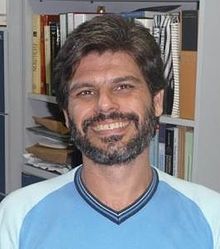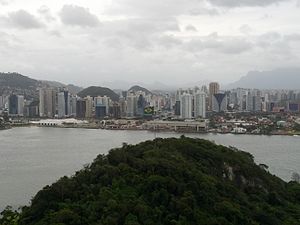
“I think that the knowledge produced by high-qualified college students should be available to anyone,” Professor Yuri Leite says. That’s why he has encouraged his biology students at the Universidade Federal do Espírito Santo in Vitória, Brazil, to contribute to Wikipedia as part of their course assignments.
The idea came to him one day in 2009, when he was coordinating a graduate level seminar on the Charles Darwin book “The Origin of Species.” Each week, the class discussed a chapter of the book and improved the article on the Portuguese Wikipedia about Darwin’s book as they went along. Before Yuri’s class began work, the article was what’s known as a stub — a short article without much content. By the end of the term, his class had transformed the article, with extensive descriptions of each chapter.
“I think it is a waste of time, energy, knowledge, and often paper to have highly skilled undergraduate or graduate students write term papers that will be read only by the teacher and sometimes a TA, and will eventually end up in the trash can,” Yuri says.
He had always been interested in using the Internet as a teaching tool. As a teaching assistant at the University of California at Berkeley in the 1990s, Yuri found the University of Michigan’s Animal Diversity Web and Berkeley’s Understanding Evolution portals inspirational.

He started using Wikipedia in his undergraduate Evolution course since August 2011. The course is mandatory for all biology students, and Yuri has about 30 students enroll each term. He says it will only take a few years to have his students make hundreds of contributions to free, high-quality knowledge available in Portuguese about the topics. He also sees better learning for students with a Wikipedia assignment in comparison to a traditional term paper.
“I believe they learn more, especially regarding proper citation, and what is original research and what is not. Both of these concepts are very important in science,” he says. “Wikipedia does a great job in terms of defining what an encyclopedia is, and how one should write an article citing appropriate sources, and this is a very important skill for students.”
And Yuri says his students feel more responsibility to produce high-quality work because they know their writing will be available to anyone on Wikipedia. He’s excited about the Wikipedia Education Program in Brazil, and he hopes that more professors will join the program and develop more teaching resources to stimulate the use of Wikipedia in the classroom. In fact, professor Aureo Banhos, one of his former biology students, has joined the program through an open call Wikimedia Foundation made in Brazil for the second school term of 2012 and is excited to collaborate with Yuri.
“I love reading the assignments and feeling like my students made a significant contribution by posting high-quality information on the web,” Yuri says.
LiAnna Davis
Wikipedia Education Program Communications Manager

Can you help us translate this article?
In order for this article to reach as many people as possible we would like your help. Can you translate this article to get the message out?
Start translation